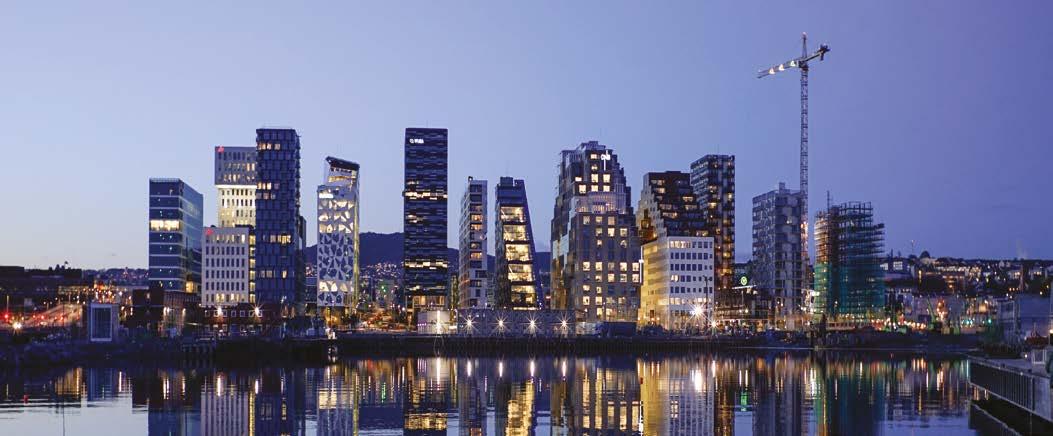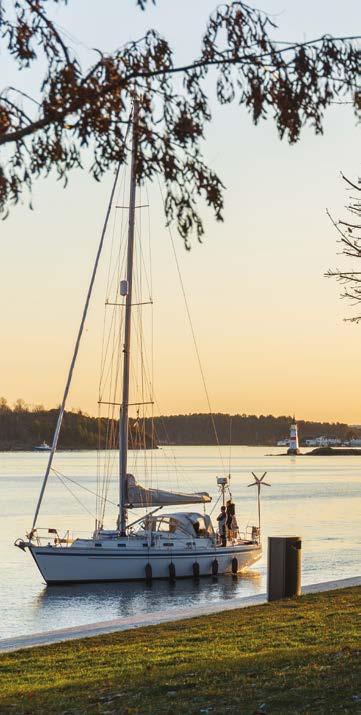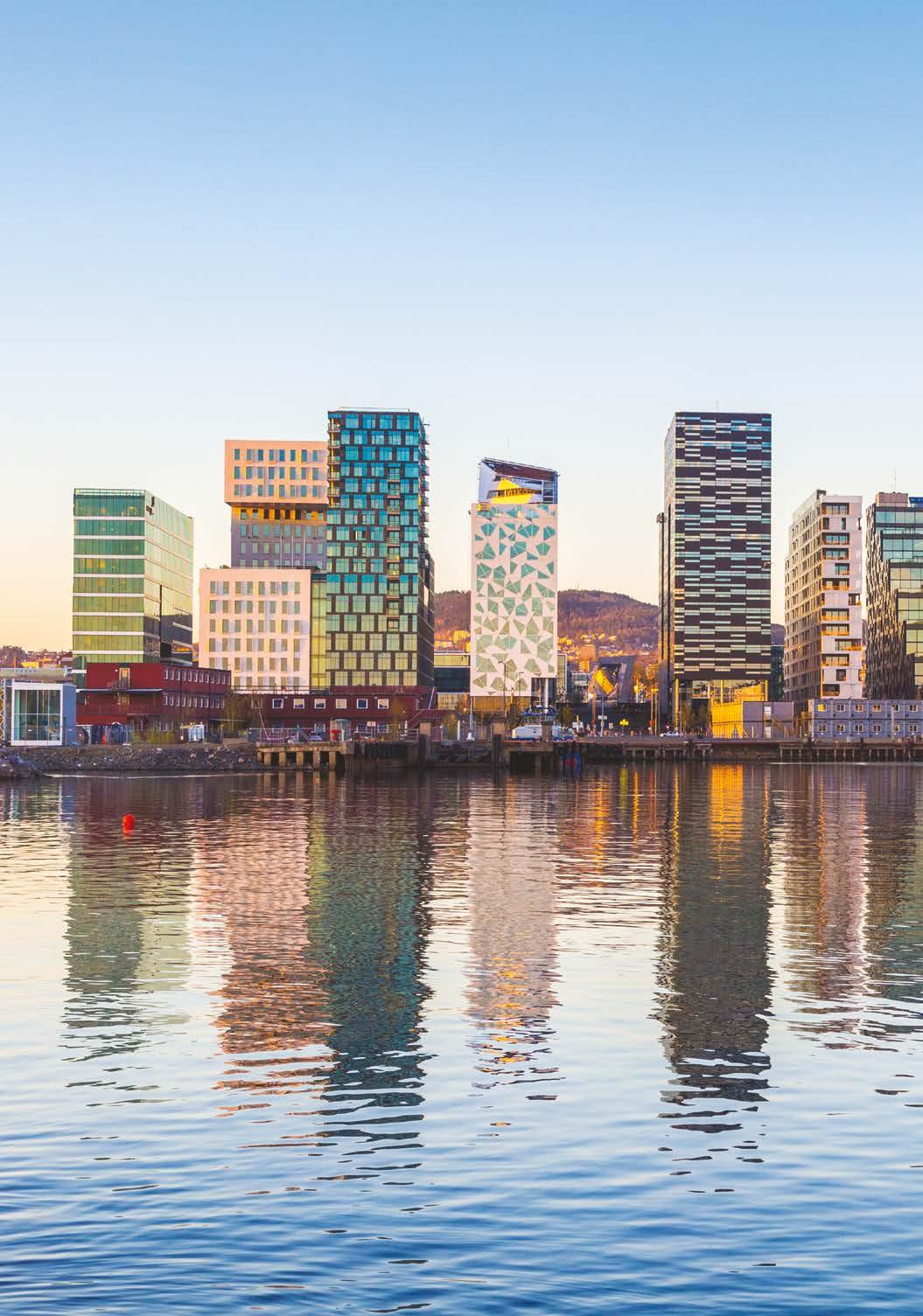
5 minute read
Welcome to Oslo
A day… A typical day for Oslo locals varies depending on the season. In the summer, the days and evenings are longer and people spend a lot more time outdoors, whereas in the winter, hygge at home is key to get through the long and dark season. Working days are shorter than in many other countries, and most meals are eaten at home.
7AM The day begins with a small but healthy breakfast, often cereal or open sandwiches made from dark, wholegrain bread with meat or cheese spread, juice, and a lot of very strong coffee. Many supermarkets open this early, for those who’ve forgotten to buy bread the day before.
8-9AM Offices open and the working day begins.
10AM Shops and shopping centres open their doors to customers.
11AM
with more open sandwiches with simple spreads, and even more strong coffee. You’re also allowed a sweet pastry, to get your blood sugar back up for the next part of the day. Lunch is short, usually half an hour, and then it’s straight back to work.
4-5PM Most offices close for the day around this time, whereas shops stay open throughout the evening. If your working day is over, this is when you either go home to your family for dinner or meet friends at your favourite restaurant or food court. Dinner is the biggest meal of the day, and usually the only hot one. Whether it consists of meat, fish, vegetarian or vegan food, dinner is a time to sit down with your loved ones to relax, laugh, and reflect on the day so far. Dessert is usually saved for the weekend, but you’re allowed a cup of coffee or two after the meal. Norwegians swear it helps digestion!
8PM Usually the last proper meal of the day – another meal mainly consisting of dark bread. And yes, Norwegians still drink coffee. Strong coffee.
11PM This is when Norwegians tend to go to bed on weekdays, to ensure they get enough sleep for the next day. In the winter, it might be earlier, and in the summer it might be later. Weekends are an exception, as most young adults finally head out around this time after pre-partying at home. Norwegian clubs and bars are expensive, so it’s common to start with a group of friends at home and head out late in the evening.
SOS Norway Hopefully, this is knowledge you won’t be needing during your stay, but if you do find yourself in a situation where you need medical or legal help, here’s what you need to know.
Norwegian emergency numbers differ from the UK, in that there are three separate numbers depending on what you need. For police, dial 112; for ambulance, dial 113; and if there’s a fire, it’s 110. Don’t worry, though – if you can only remember one of them, let them know what you need help with and they’ll put you through to the right place. English is spoken by all, so you don’t have to know what to ask for in Norwegian.
If you need medical assistance but you don’t quite need an ambulance, there are two general emergency rooms in Oslo, one centrally located at Storgata, and one at Aker Sykehus a bit further out from the city centre. The Storgata emergency room specialises in injuries. They both tend to illnesses, and once you get there, they will talk to you and determine the urgency of your issue, and then tell you where to wait and how long the wait is expected to be. Urgent issues are prioritised. To contact the emergency rooms in advance, or for questions, call +47 116117 or +47 23 48 72 00.
If you need the police, they can be seen walking, driving or riding horses along the streets, and are always happy to have a chat. If you need attention urgently, either call the emergency number or, if you’re in a place with security guards, let them know and they can contact the police for you.
If you need help with a stolen passport or any other issues for which you need the British Embassy, it can be found at Thomas Heftyes gate 8, 0244 Oslo, or you can call them on +47 23 13 27 00. Their hours are 9am to 4pm Monday to Friday.

© Didrick Stenersen
Proper etiquette Tipping? The concept of tipping is practised very loosely in Norway. Most Norwegians never carry cash, and most restaurants, bars, taxis and cafés use card machines where you’re shown the full amount and get the chance to add however much you want. Most Norwegians round up the final price to the closest full number, so if a drink costs 77 NOK, you round it up to 80 NOK. For huge meals with several courses you may add a bit more, but food and drink are already expensive and wages are high, so tipping is just a way to show that you really appreciated the service and food. Some places include a service charge on the bill, so no extras need to be added unless you’ve ended up with lots of spare change that weighs you down. Tipping is a good way to get rid of coins, in a country where fewer and fewer places accept cash as payment.
Being loud? On the surface, Norwegians are quiet and reserved people, and unless alcohol is involved, people keep their voices respectfully quiet. You won’t often hear shouting or loud people on the streets or in shops or restaurants. However, when alcohol is involved, Norwegians tend to loosen up a bit and the volume rises, as well. Most areas, even in central Oslo, have residential spots, so be respectful when leaving bars or clubs as there will be people living nearby. The reservedness also includes talking to people you don’t know. Walking up to strangers to chat is unheard of, unless you need to ask for directions.
Being late? Don’t. Being late is seen as disrespectful, and if asked, most Norwegians will list people being late as their number-one pet peeve. If dinner starts at 5pm, be there at 5pm, not at 5.30pm, or the food may well be gone. Of course, accidents happen and every now and then being late can’t be helped, but if you know that you’re about to be late, let the rest of the group know. If notice is given, people are usually very forgiving. If you’re late to an appointment, call in advance and let them know; often they can rearrange to accommodate you. If no notice is given, there tends to be a ten-minute window before the appointment is cancelled, in which case you might still be charged.












